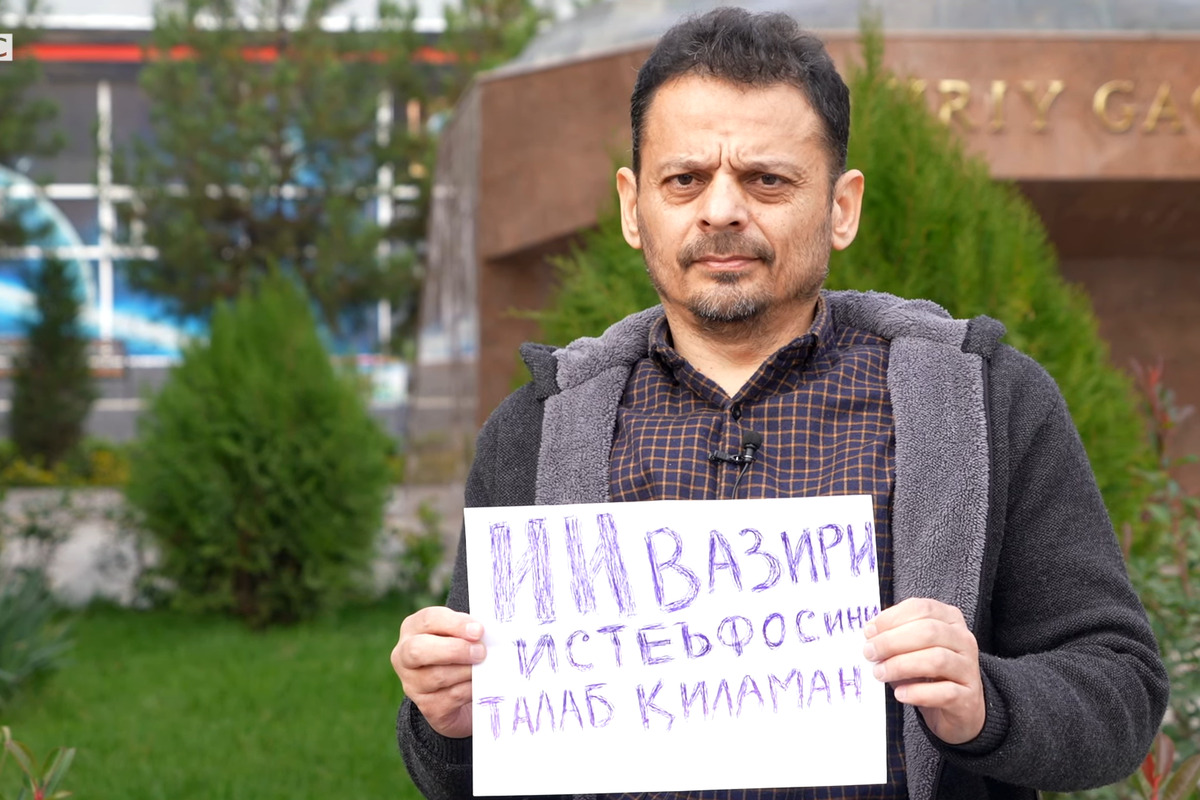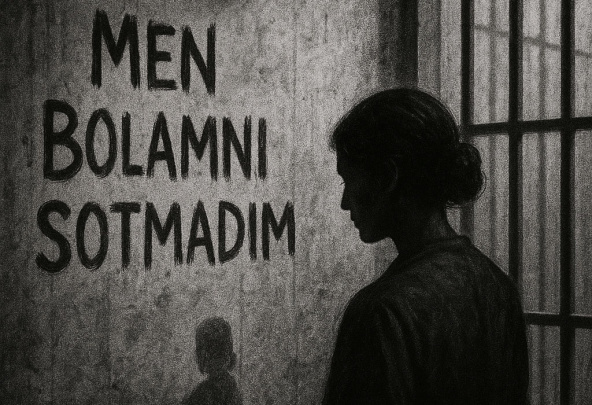Blogger organizes a picket in Tashkent demanding resignation of MIA head
Publicist and blogger Shokir Sharipov organized a one-man picket in front of the statue of Gagarin in the capital on November 22, demanding the resignation of Pulat Bobojonov, the Minister of Internal Affairs of Uzbekistan. He says that he decided to hold a picket because of a 15-year-old boy beaten death at the Juvenile Socio-Legal Assistance Center of the Kokand city DIA.

Photo: YouTube / BBCUzbek
Shokir Sharipov, who talked to Mirolim Isajonov, a Gazeta.uz reporter, said that at the moment no real reforms have been implemented in the internal affairs system, on the contrary, the public’s dissatisfaction with the sector is growing more and more.
“After seeing the sincerity of Shavkat Mirziyoyev when he came to power, I believed that a number of reforms will be implemented in the country. In addition, there was hope that the internal affairs system would be reformed and a positive situation would emerge. Because I am well aware of the results of the reforms made in Georgia and several other former Soviet countries, how people’s attitudes towards the police have changed, and how citizens consider an internal affairs officer a friend and are happy to see him. I dreamed that such a scene would appear in Uzbekistan, and I really expected it. True, a number of things are being done in the field. But we don’t see the reforms in the literal sense, the reforms are being delayed,” he said.
Sharipov said that he, as a citizen, was dissatisfied with the system and decided to hold a picket.
“Each time I read reports about corpses of citizens coming out of DIA buildings, internal affairs officers using force, torturing or beating people, and similar cases, my internal rebellion and protest grows stronger. The saddest thing is that the Ministry’s attitude towards such incidents both surprises and angers me. I was particularly moved by the death of a 15-year-old boy, who was discharged from the DIA building in Kokand. I felt the condition of the deceased’s parents and relatives. Sometimes I couldn’t have food even. My conscience is tormented, I fought against myself. The rebellion inside me as a citizen forced me to hold a picket demanding the resignation of the Minister of Internal Affairs,” Shokir Sharipov said.
According to him, after the death of the 15-year-old boy, the Minister of Internal Affairs should have appeared before the people, admitted that he could not reform the sector, apologized and resigned. But he couldn’t do that.
“I am surprised by one thing: why do the officials in Uzbekistan lack empathy – the ability to put oneself in someone’s place and feel their inner state? In fact, the best people of the society, who have strong empathy, should work in such positions,” the publicist said.
According to Shokir Sharipov, it is a very bad signal that Pulat Bobojonov is not bothered by the cases of citizens dying in DIA buildings.
“A normal official should publicly apologize and resign after the horrific death incidents in the system. If it does not leave the system, then the whole society is sick. The fact that the minister is not bothered by the fact that civilians are dying in the IIB buildings is a very bad signal. Underneath this signal lies a long chain. If the minister behaves like this, then his attitude towards the people should be the same. As long as he is treating the people like this, then the environment around him is like this. If such an environment is formed, it is a sign of problems. The corpses of citizens are coming out, but we do not see mourning on the faces of the system leadership. This is a very dangerous trend. After the people lose faith in the state, the outcome will not be good. If the society is indifferent to such situations, such events may happen to each of us tomorrow,” the blogger said.
Shokir Sharipov also expressed his opinion on why the minister is not severely punished or fired even though there are many people who are dissatisfied with the system.
“Even after the events in the internal affairs system, confidence is being expressed in Pulat Bobojonov, but citizens are starting to have very bad suspicions about all the leaders at the top of the state. It is logical to conclude that those who are in charge of the state ignore the people. As long as this minister is not fired, it can be concluded that the decision-making leaders at the top have a feeling that “the people are a herd, it is okay if they are dissatisfied, reforms will happen gradually”. Logical conclusions are formed because the public does not know something specific, or because normal punishment is not applied to the minister,” he said.
He said that if the minister of internal affairs resigns and a new leader arrives, the system will not change suddenly. However, everyone should understand the need for serious reforms in the sector.
“All of us [both the government and the population] should understand that this system must be reformed and this sector is also a face of the state. The system will not change overnight if the current minister of internal affairs leaves his post and is replaced by another. But when we realize how seriously this system needs reform and how quickly we need to make changes, the leaven of reform will appear. After that, it is possible to make a clear decision about which work to do and which suitable personnel to transfer to this position,” Shokir Sharipov said.
In an interview with BBC Uzbek service, Shokir Sharipov said that journalists and bloggers seem to be talking to concrete, they are getting tired because the ministry is not getting results.
“When the Ministry of Internal Affairs was asked to give a reaction, it said that there are such cases in the MIA premises. There will be cases of acquittal of internal affairs officers. There is no way to say: “It was a really wrong move, we are surprised by such cases, we will take measures against the employees”. Journalists seem to be referring to concrete. They are getting tired because there is no result,” he said.
Shortly after Shokir Sharipov’s interview with the BBC, on November 23, the MIA press secretary, Shokhrukh Giyasov, stated that the Ministry is ready for an open dialogue: “We inform you that the Ministry of Internal Affairs is ready for an open dialogue regarding all the questions and suggestions of the public activist Shokir Sharipov in the interview organized by the BBC reporter”.
Recommended
List of streets and intersections being repaired in Tashkent published
SOCIETY | 19:12 / 16.05.2024
Uzbekistan's flag flies high on Oceania's tallest volcano
SOCIETY | 17:54 / 15.05.2024
New tariffs to be introduced in Tashkent public transport
SOCIETY | 14:55 / 05.05.2023
Onix and Tracker cars withdrawn from sale
BUSINESS | 10:20 / 05.05.2023
Latest news
-
Direct flight from Tashkent to the Maldives — every Sunday
SOCIETY | 09:00
-
Uzbekistan establishes diplomatic relations with Eritrea
POLITICS | 17:46
-
President Mirziyoyev reviews industrial projects in Tashkent’s Chilanzar district
SOCIETY | 17:09
-
Tashkent to modernize 200 km of roads with Chinese investment
SOCIETY | 17:08
Related News

15:24 / 27.06.2025
Tashkent launches AI center to combat traffic jams and enhance road safety

17:57 / 24.06.2025
Staged crimes in Navoi: Two young women jailed in police-orchestrated cases

19:46 / 30.05.2025
Police take action against showbiz personalities over staged stadium fight

20:36 / 29.05.2025



